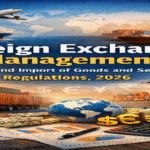The Reserve Bank of India (RBI) has initiated a major regulatory transformation with the release of the Draft Foreign Exchange Management (Export and Import of Goods and Services) Regulations, 2025. This landmark reform is set to redefine India’s foreign exchange management landscape by streamlining trade-related compliance under FEMA, 1999, improving ease of doing business, and decentralizing key decision-making to Authorized Dealer (AD) banks.
These new FEMA Regulations 2025, issued on April 4, 2025, reflect RBI’s commitment to modernizing export-import governance. With global trade increasingly driven by digital services and software exports, the updated framework introduces clarity, efficiency, and traceability in international transactions.
Background and Implementation Timeline
The Draft FEMA (Export and Import of Goods and Services) Regulations, 2025, follows extensive stakeholder consultations, including feedback from trade bodies, exporters, importers, and financial institutions. The final FEMA rules are expected to be notified soon.
Expanded and Inclusive Definitions Under FEMA 2025
One of the key highlights of the Draft FEMA Regulations 2025 is the broader and clearer definition of exports and imports, especially for the booming service sector and digital economy.
Export of Services: Now includes delivery of services from India to clients located abroad. Software-as-a-Service (SaaS) providers, IT services companies, and freelancers will benefit from this explicit inclusion.
Import of Services: Covers inbound digital, professional, and software services procured by Indian residents.
This expanded scope eliminates ambiguity and simplifies FEMA compliance for tech startups, SaaS businesses, and consulting firms engaged in cross-border service delivery.
Timeline of payment for export and import of goods and services
Proposed Timelines for Export and Import Payments:
- Export Transactions:
- General Exports (Goods and Services): Export proceeds must be realized and repatriated to India within 9 months from the date of shipment for goods and from the date of invoice for services.
- Exports to Warehouses Abroad: For goods exported to warehouses outside India, the realization period is 9 months from the date of sale of goods, replacing the earlier 15-month period from the date of shipment.
- Project Exports: Payments are to be realized as per the terms specified in the underlying contract.
- Extensions: Authorized Dealer (AD) banks are empowered to grant extensions for the realization period based on their internal policies and after assessing the bona fide reasons provided by the exporter.
- Import Transactions:
- General Imports: The strict 6-month time limit for import payments has been removed. Payments for imports are now to be made as per the contractual terms agreed upon between the importer and the overseas supplier.
- Extensions: AD banks may permit extensions beyond the agreed contractual period if there are genuine reasons, such as delays in settlement or fulfillment of obligations by the overseas supplier.
Additional Provisions:
- Advance Payments: The requirement for exporters to complete shipments within one year of receiving advance payments has been removed. The timelines for fulfilling export obligations against advance payments will now be governed by the terms of the export agreement.
- Refund of Advance Payments: Exporters can refund unutilized portions of advance payments without prior RBI approval, subject to the AD bank’s internal policies and after assessing the bona fide nature of the transaction.
Unified Export Declaration Form (EDF): Simplifying Export Compliance
Under the FEMA 2025 draft, all exporters—whether of goods, software, or services—must file a standardized Export Declaration Form (EDF). This consolidation enhances transparency and reduces the administrative burden.
Small Exporters Relief: If a service exporter raises multiple invoices under ₹1 lakh/month to different overseas clients, a consolidated monthly EDF may be submitted.
Flexible Timelines: The previous 21-day submission requirement post-shipment or invoicing is now relaxed, at the discretion of AD banks, subject to valid justification.
This is a welcome change for Indian exporters aiming to reduce procedural bottlenecks and improve working capital cycles.
New Filing Authorities: Dismantling the STPI Mandate
The Draft FEMA Regulations 2025 mark a structural shift by discontinuing the role of Software Technology Parks of India (STPI) in export compliance filings.
- Domestic Tariff Areas (DTAs): AD banks will now act as the primary authority for export documentation.
- Special Economic Zones (SEZs): The Development Commissioner will handle export-import compliance responsibilities.
This change aligns documentation under the financial system, ensuring consistency and better oversight.
Empowerment of Authorized Dealer (AD) Banks: Decentralization in Practice
A core feature of the FEMA 2025 draft is the increased delegation of powers to AD banks, ensuring faster decision-making and reduced dependency on RBI for routine approvals. Under the new framework, AD banks can:
- Approve advance import payments after verifying authenticity.
- Permit third-party payments for export-import transactions.
- Authorize set-offs between export receivables and import payables between the same or group entities.
- Allow reductions in export proceeds—even beyond 25%—without board approval.
This decentralization enhances the role of AD banks in foreign exchange management, fostering quicker turnaround and improved compliance support for Indian exporters and importers.
Write off & Set Off
Elimination of Previous Thresholds in case of Write off: The draft regulations propose removing the earlier thresholds that allowed exporters to self-write-off up to 5% and permitted Authorized Dealer (AD) banks to write off up to 10% of the invoice value. Under the new draft, AD banks are empowered to approve write-offs up to 100% of the export value, provided they are satisfied with the bona fides of the transaction and it aligns with their internal policies.
Permitted Set-Off Between Same Parties: Authorized Dealer (AD) banks may allow the set-off of export receivables against import payables involving the same overseas buyer or supplier, or their overseas group or associate companies.
Financial Discipline and Realization Safeguards
The FEMA 2025 draft introduces robust mechanisms to improve foreign exchange realization:
- If export proceeds over ₹25 crore remain unrealized for over two years (including permitted extensions), the exporter must adopt 100% advance payment or irrevocable Letters of Credit (LCs) for future exports.
- For large-value import advances (above ₹25 crore) that do not materialize into imports, future advances must be backed by:
- A standby LC, or
- A guarantee from a reputed international bank, or
- An Indian AD bank guarantee backed by a foreign counter-guarantee.
These safeguards target high-value exporters and importers, reinforcing fiscal discipline in cross-border transactions.
Liberalized Merchanting Trade and Project Export Provisions
The FEMA Draft Regulations 2025 recognize India’s growing participation in global intermediary trade and infrastructure exports:
- Merchanting Trade: The outlay period between the outward & inward remittance has been extended to 6 months which was earlier 4 months, based on justifiable documentation.
- Project Exports: Exporters undertaking overseas infrastructure projects may retain surplus foreign exchange abroad in approved short-term investments or foreign bank accounts.
These liberalized provisions improve liquidity management and give Indian exporters greater flexibility in managing overseas projects.
Internal Policy Frameworks for AD Banks: Ensuring Responsible Autonomy
To ensure consistent governance, FEMA 2025 mandates that every AD bank must establish a comprehensive internal policy covering:
- Transaction processing guidelines
- Risk and exception handling mechanisms
- Reporting and audit protocols
The internal policy must be board-approved within six months of final notification, ensuring responsible decentralization in foreign exchange management.
Actionable Steps for Exporters and Importers
Businesses involved in international trade must begin realigning their operations in light of FEMA Regulations 2025. Key preparatory actions include:
- Revamp documentation workflows, particularly around EDF filing and tracking export realizations.
- Engage proactively with AD banks to understand their new roles, powers, and compliance expectations.
- Reassess cross-border transactions involving related parties or third-party payments to ensure regulatory alignment.
- Plan risk mitigation strategies using Letters of Credit, guarantees, and transaction justifications, especially for high-value trade.
Final Take: A Strategic Shift in India’s Foreign Exchange Landscape
The Draft FEMA (Export and Import of Goods and Services) Regulations, 2025, marks a watershed moment in India’s trade and foreign exchange regulation. With streamlined compliance, digital-first processes, and empowered banks, the new FEMA framework is aligned with India’s ambition to be a leading global trade hub.
Indian exporters and importers who proactively adapt to these changes will benefit from greater operational flexibility, improved regulatory clarity, and faster transaction timelines under the new FEMA regime.
How OSGAN Consultants Can Support Your FEMA Compliance Journey
At OSGAN Consultants, we are experts in FEMA compliance, RBI export-import regulations, and international trade advisory. Our services include:
- Transaction structuring under FEMA 2025
- Documentation and EDF filing support
- Audit and compliance preparation
- LCs, guarantees, and advance payment planning
- Representation to RBI
Get in touch with our FEMA specialists to ensure your business stays fully compliant and future-ready under the RBI’s evolving export-import policy framework.




